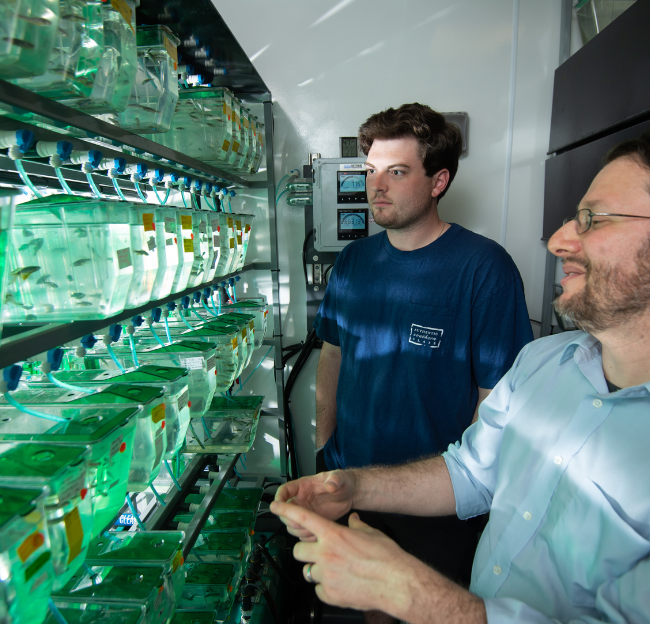Research Integrity, Security, and Compliance
Ensure your research meets ethical, security, and regulatory standards with expert support.
Navigate research regulations with confidence by leaning on our in-house experts
As a researcher, your focus should be on discovery, innovation, and creating impact, but meeting compliance requirements is essential to advancing your work. That's where we come in. Our team of experts is here to support you through every step of the process, helping you ensure your research meets the highest standards of integrity, security, and compliance.
We’re here to provide guidance, answer questions, and equip you with the tools you need for compliance while keeping your research on track.
Looking for something?
Required trainings
Research at the University of Mississippi is held to the highest standards of ethics and integrity, and meeting those standards often starts with training. Different training programs are mandatory for personnel involved in certain research activities or working in areas where these research activities are taking place to ensure compliance with with federal regulations and university policies.
Whether you’re conducting human subjects protections, managing data, or mentoring student researchers, it’s important to complete the appropriate training early in your research process. Most training modules are required before research activities begin, and certifications must be kept up to date to maintain compliance.
Below, you’ll find information on the key training programs required for research at the university, along with instructions on how to get started.
For information on setting up a CITI account, visit our Research Safety page.
All Principal Investigators (PIs) and key personnel involved in sponsored projects—including staff, postdoctoral fellows, and graduate and undergraduate students—are required to complete RCR training.
Visit our Responsible Conduct of Research Guidelines page for details on enrolling in the CITI course.
For research involving human participants, the following training options are available:
Abbreviated Human Subjects Training: Designed for researchers conducting studies that qualify as Exempt in the IRB review process. This training is completed via a Qualtrics quiz and must be renewed every two years.
CITI Human Subjects Training: Required for research personnel who engage in research with humans or their data. This comprehensive training covers various aspects of bioethics and human subject research. Certification is valid for three years, after which a refresher course is necessary.
Instructions for accessing both trainings is available on the Human Subjects Research page.
- Radiation Safety- this training is required for personnel working with radioactive materials.
- Radiation-generating Devices- this training is required for personnel working with radiation-generating devices.
- Laser Safety- this training is required for personnel working with Class 3B and 4 lasers.
Researchers who are a part of animal research must complete the IACUC required CITI training:
- Working with the IACUC, and
- Species specific or Wildlife, as relevant to the work you will do, and
- Laboratory Chemical Safety, and
- Animal Biosafety
If applicable, they also must complete:
- Aseptic Surgery, for anyone performing surgical techniques
- Minimizing Pain and Distress, for anyone performing procedures that fall into Pain and Distress Category D and/or E.
For more information, visit our Animal Research page and handbook.
Each PHS Investigator must complete conflict of interest training prior to engaging in Research, at least every four years thereafter, and immediately under these circumstances:
- When this policy changes in a manner that affects Investigator requirements.
- When an Investigator is new to the Institution.
- When an Investigator is not in compliance with this policy or a Management Plan.
The training is done through CITI.
Research security CITI training can be found titled "Export Control."
Targeted in-person trainings for departments or research groups can be requested by emailing umresearchsecurity@olemiss.edu.
Upholding integrity: a shared responsibility
Maintaining integrity in research is a responsibility that extends across the entire academic community. For researchers, it’s about building trust—both in the validity of their work and their commitment to ethical practices. Integrity ensures that the knowledge you generate is respected, reproducible, and valuable to your field.
For the University of Mississippi, upholding integrity reflects our dedication to fostering a culture of excellence and accountability. It strengthens our ability to secure funding, attract collaborators, and maintain our reputation as a leader in innovation and discovery.
By adhering to ethical and regulatory standards, we demonstrate respect for those who make our research possible and reinforce the public's trust in our mission.
Compliance requirements in university research
Numerous federal, state, local, and university laws and regulations require the University to commit to institutional oversight of activities involving humans, animals, biological hazards, recombinant nucleic acids, and radiation producing materials and devices. The Research Integrity, Security, and Compliance office is the unit responsible for ensuring the University's commitment is upheld. Researchers whose projects, whether externally funded or not, will involve one or more of these activities must obtain the appropriate institutional review/approval before research can begin.
Federal funding is at risk institution-wide if individuals do not comply with these requirements.

